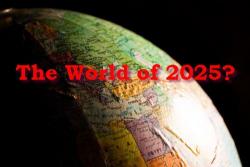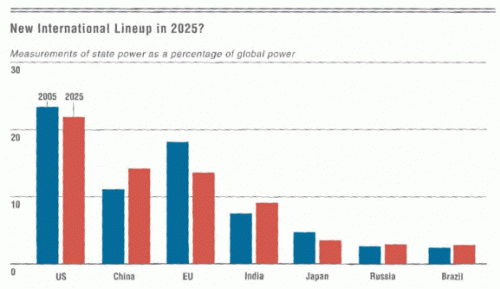
One of the more provocative projections in the NIC’s “Global Trends 2025” report is a prediction of the end of U.S. dominance in world affairs.
This is, however, subject to misinterpretation. For example, NPR’s Tom Gjelten‘s report on today’s “Morning Edition” is entitled with the headline “By 2025, Analysts Say U.S. Won’t Be World Power” and says, “They predict the U.S. probably won’t be the dominant world power.”
Here’s what the Executive Summary says:
The United States: Less Dominant Power By 2025 the US will find itself as one of a number of important actors on the world stage, albeit still the most powerful one. Even in the military realm, where the US will continue to possess considerable advantages in 2025, advances by others in science and technology, expanded adoption of irregular warfare tactics by both state and nonstate actors, proliferation of long-range precision weapons, and growing use of cyber warfare attacks increasingly will constrict US freedom of action. (xi)
In Chapter 7, Power-Sharing in a Multipolar World, they go even further:
We believe that US interest and willingness to play a leadership role also may be more constrained as the economic, military, and opportunity costs of being the world’s leader are reassessed by American voters. Economic and opportunity costs in particular may cause the US public to favor new tradeoffs. (93)
At the same time however, some perspective is needed. As NIC chairman Thomas Fingar emphasized in his Atlantic Council speech last night, we’re talking about a relative decline. How relative?
The chart below appears on page 28:

If I’m interpolating correctly, the U.S. share of global power drops from something like 24 percent all the way down to 22 percent. The EU, currently the number two actor, goes from something like 18 percent to 14 percent and drops ever-so-slightly behind a rising China, which goes from 11 percent to 15 percent. India goes from 7 percent to 9 percent. And Japan, Russia, and Brazil move about 1 percent each.
As the analytical portion of the report makes clear, these changes would be significant for a variety of reasons. But, if these projects prove accurate — which, as I noted last night, is an open question — the United States will remain by far the most significant actor — indeed, its lead over the number two actor will have grown — but current regional powers will demand more attention.
What’s curious, however, is the notion that this hasn’t been the case for some time now. To be sure, there was a cottage industry in the aftermath of the Cold War writing books and articles proclaiming, as Charles Krauthammer put it in a milestone Foreign Affairs piece, “The Unipolar Moment.” The United States was unquestionably the world’s dominant military, economic, and cultural power. Eighteen years later, we still are. Reading the NIC report, that’s likely to still be true eighteen years from now.
What we quickly learned, however — and continue learning in Iraq and Afghanistan, as well as less kinetic venues — is that unipolarity is not the same thing as hegemony. Being The World’s Sole Remaining Superpower™ didn’t help much in chasing down Somali warlords or provide the political will to intervene in Rwanda. Nor has being the world’s dominant economy meant an absolute ability to make rising economies like China abide by international norms in matters such as respecting intellectual property rights, much less regulate the flow and price of oil.
What the 2025 report is forecasting, then, is not so much a change in reality but that Americans will finally come to terms with the limits of our power. Post-Iraq, we’re likely going to have a substantially diminished appetite for military intervention aimed at “spreading democracy.” The current financial mess, combined with the election of a Democratic president, is likely to make us more interested in participating in global regulation.
Some of this will be welcome news to friends and competitors alike. Some of it, however, will not. Our European Allies, in particular, may well be forced to substantially increase military spending to make up for decreased American commitments.
James Joyner is managing editor of the Atlantic Council. Photo by Flickr user ToastyKen modified by the author under Creative Commons license.
GLOBAL TRENDS 2025 SERIES:
- Global Trends 2025: A Transformed World
- NIC Chairman Thomas Fingar Presents “Global Trends 2025”
- Predicting the Future is Hard – And Necessary – James Joyner
- U.S. Dominance Ending – James Joyner
- Terrorism Here Today, Gone Tomorrow? – James Joyner
- Asia’s Ascendency Seen in Intelligence Forecast – Joseph Snyder
- Climate Change Will be More Severe in 2025 –Erica McCarthy
- Economic Rise of the East – James O’Connor
Image: globe-2025.warsawbiopic.jpg
